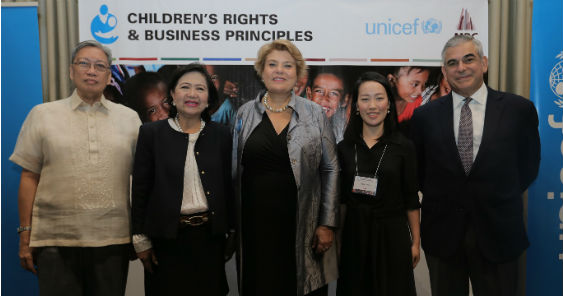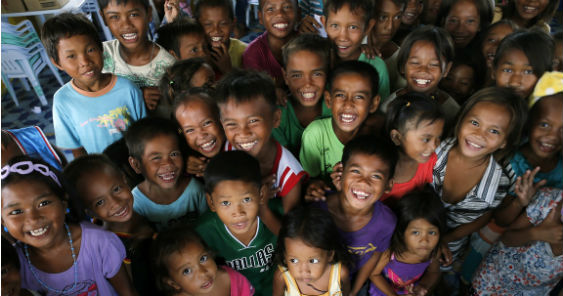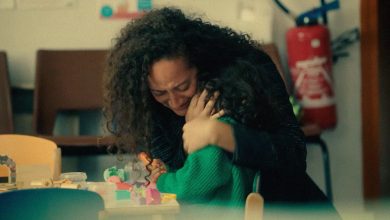MAKATI CITY – UN children’s agency UNICEF, in partnership with the Makati Business Club (MBC), today launched the Children’s Rights and Business Principles (CRBP) to members of the Philippine business community. The launch includes prominent CEOs and partners such as Chairman Jaime Augusto Zobel de Ayala of the Ayala Group of Companies.
The Children’s Rights and Business Principles (CRBP) is the first comprehensive set of principles to guide private sector companies on the full range of actions they can take in the workplace, marketplace and community to respect and support children’s rights. While the business and human rights agenda has evolved significantly in recent years, a child rights perspective has not yet been sufficiently addressed.
The CRBP were released in 2012 in London, bringing together leading companies and experts to discuss and showcase ways in which business can respect and support children’s rights in their core operations. This 2017, the Principles will be introduced to the Philippine business community with the aim to inspire companies to incorporate a child rights’ lens to their business practices.

Business leaders unite for the Philippine launch of UNICEF’s Children’s Rights and Business Principles, advocating for the protection and upholding of children’s rights and welfare across the industries and communities they operate in. With UNICEF Philippines Representative Lotta Sylwander (centre) are [L-R] Makati Business Club President Edgar Chua, SM Supermalls President Annie Garcia, H&M Hennes & Mauritz Asia Regional Sustainability Manager for Asia Wong Xin Yi; and Ayala Group of Companies Chair and CEO Jaime Augusto Zobel de Ayala. © UNICEF Philippines/2017
“Because children under the age of 18 account for almost a third of the world’s population, it is inevitable that businesses, whether small or large, will have an effect on the lives of children, both directly and indirectly. Children are affected by business in a variety of ways – as consumers, as members of employees’ families, as future employees themselves and as eventual business leaders. They also live in the communities and share the environments in which businesses operate,” UNICEF Philippines Representative Lotta Sylwander says.
In the Philippines, companies are beginning to rethink their business practices not only to respect – doing the minimum required to avoid infringing on children’s rights; but to support – taking voluntary actions that seek to advance the realization of children’s rights.
UNICEF is convening government agencies and regulators, law enforcement, global organizations, internet service providers and social networking service companies to stop the creation and circulation of online child sexual abuse content. Online child sexual abuse is the leading form of cybercrime in the Philippines.

UNICEF Philippines also partnered with SM Supermarkets, one of the largest retail companies in the country, to assess the quality of the iodized salt sold in its supermarkets. As a result, all salt vendors of the SM Supermarket group are now required to submit on a quarterly basis a valid Certificate of Analysis indicating the desired level of iodization, as prescribed by the FDA on all packaged salt supplied to their stores nationwide. Iodine is an essential nutrient for brain development that can increase a child’s IQ up to 15 points.
“We invite each and every one — from the biggest to the smallest companies — to work with UNICEF to ensure the rights of every child. In the same way that businesses ensure the sustainability and environmental responsibility of its operations, so should it ensure protection of children’s rights. In the same way that you make your business earth-friendly, so should it be child-friendly as well,” Sylwander adds.

According to the Children’s Rights and Business Principles, all businesses should:
PRINCIPLE 1: Meet their responsibility to respect children’s rights and
commit to supporting the human rights of children.
PRINCIPLE 2: Contribute to the elimination of child labour, including in all
business activities and business relationships.
PRINCIPLE 3: Provide decent work for young workers, parents and
caregivers.
PRINCIPLE 4: Ensure the protection and safety of children in all business
activities and facilities.
PRINCIPLE 5: Ensure that products and services are safe, and seek to support
children’s rights through them.
PRINCIPLE 6: Use marketing and advertising that respect and support
children’s rights.
PRINCIPLE 7: Respect and support children’s rights in relation to the
environment and to land acquisition and use.
PRINCIPLE 8: Respect and support children’s rights in security arrangements.
PRINCIPLE 9: Help protect children affected by emergencies.
PRINCIPLE 10: Reinforce community and government efforts to protect and
fulfill children’s rights. Use bullet points in this format if necessary










